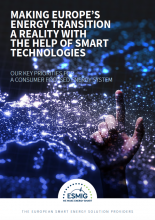The European Energy Union strategy aims to guarantee accessible, affordable, secure, competitive and sustainable energy for all Europeans.
To achieve these objectives and meet our carbon targets, the European energy market must undergo fundamental changes. We need to rapidly move from a market driven by fossil fuels designed around big central controllable generation units to a ‘demand-driven’ energy system, integrating renewables and more local generation and storage solutions where customers are at the heart of the system.
The timing of electricity management, related to when and where electricity is needed on the grid, will matter far more in coming decades due to an increasing reliance on distributed energy resources and the integration of large and small renewables.
Moreover, consumers will have the right tools to increase their consumption during supply peaks and reduce it when the system is on a low supply or when there is high demand. The number of prosumers will grow, along with the flexibility of consumption increasing. However, this will only be possible if customers have access to systems that work for them. It is crucial to prevent unplanned downtime that could impact the flexibility and energy supply.
Smart metering systems and access to real time energy data are both indispensable to empower the consumer and to ensure a good management of the whole system.
Why smart technologies are crucial to achieve the energy transition
For a fundamental change to happen in Europe’s energy system, the policies need to be formulated with the consumer in mind. The system needs to be designed for consumers to receive accurate and timely information, to enable them to acknowledge and change their consumption patterns, to encourage them to engage in energy generation, demand response, and to protect their rights and privacy.
Smart metering represents the greatest tool for consumer empowerment to reach the energy industry in the last 100 years. For the first time, consumers will be able to see exactly how much energy they consume, when they consume it and how much it costs. The ability to monitor and control consumption is the pre-requisite for market-based pricing and network optimisation.
Smart metering benefits such as savings on energy bills and reduced meter reading costs are a welcome economic relief, but in the long run an invaluable benefit will be the transition of our outdated energy system to a smart, demand driven, flexible and greener one.
The successful deployment of this technology across the EU is the first step in achieving this aim. The next steps require additional services and technologies that need to be available and to work with the smart meter data.
